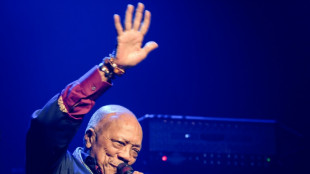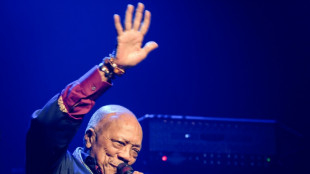
-
 Indonesian President Prabowo to visit China this week
Indonesian President Prabowo to visit China this week
-
Critically endangered Sumatran elephant calf born in Indonesia

-
 The marble 'living Buddhas' trapped by Myanmar's civil war
The marble 'living Buddhas' trapped by Myanmar's civil war
-
How East Germany's 'traffic light man' became a beloved icon

-
 Japan expresses concern to China over Russia-North Korea ties
Japan expresses concern to China over Russia-North Korea ties
-
Asian markets swing ahead of toss-up US election

-
 Palau polls open as pro-US president faces election test
Palau polls open as pro-US president faces election test
-
'Panic buttons,' SWAT teams: US braces for election unrest

-
 Hundreds of UK police sacked for misconduct
Hundreds of UK police sacked for misconduct
-
Harris, Trump fight through final campaign hours

-
 Top-ranked Nelly Korda wins LPGA Player of Year award
Top-ranked Nelly Korda wins LPGA Player of Year award
-
Israel accuses Turkey of 'malice' over UN arms embargo call

-
 Man City will 'struggle' to overcome injury crisis, says Guardiola
Man City will 'struggle' to overcome injury crisis, says Guardiola
-
First candidates grilled in parliament test for EU top team

-
 Fulham strike twice in stoppage time to beat Brentford
Fulham strike twice in stoppage time to beat Brentford
-
Saints fire head coach Allen after seventh straight NFL defeat

-
 Is the US election really so close?
Is the US election really so close?
-
Mitrovic hat-trick fires Al Hilal past Esteghlal, Neymar replaced early

-
 Three charged as Modi slams Canada Hindu temple violence
Three charged as Modi slams Canada Hindu temple violence
-
NATO will 'stay united' whoever wins US election: Rutte

-
 Turkey sacks 3 mayors on 'terror' charges, sparking fury in southeast
Turkey sacks 3 mayors on 'terror' charges, sparking fury in southeast
-
Thousands protest alleged election fraud in Georgia

-
 Spain dreads more flood deaths on day six of rescue
Spain dreads more flood deaths on day six of rescue
-
Germany's Baerbock offers Ukraine no guarantees as Kyiv sounds alarm

-
 Edu resigns as Arsenal sporting director
Edu resigns as Arsenal sporting director
-
Prince William plays rugby on S.Africa climate prize visit

-
 French boxing quits international body to keep its fighters at Olympics
French boxing quits international body to keep its fighters at Olympics
-
Gaza hospital hit as Israel tells UN aid agency ties to be cut

-
 Ailing Spurs coach Popovich reportedly out indefinitely
Ailing Spurs coach Popovich reportedly out indefinitely
-
Quincy Jones, peerless music giant, dies at 91

-
 Harris, Trump in last campaign push as polls deadlocked
Harris, Trump in last campaign push as polls deadlocked
-
Sabalenka advances to WTA Finals last four as Zheng ousts Rybakina

-
 Noah Lyles fails to make cut for men's world track athlete of year
Noah Lyles fails to make cut for men's world track athlete of year
-
Slot braced to face 'special' Alonso in Anfield homecoming

-
 Striking workers weigh latest Boeing contract offer
Striking workers weigh latest Boeing contract offer
-
Germany's Baerbock offers no Ukraine guarantees as Kyiv sounds alarm

-
 Montreux Jazz Festival hails 'godfather' Quincy Jones
Montreux Jazz Festival hails 'godfather' Quincy Jones
-
Chile football star Vidal accused of sexual assault

-
 Injured Atonio called up to France squad before Japan Test
Injured Atonio called up to France squad before Japan Test
-
'Guardiola best coach in the world', says Amorim before Man United move

-
 Fake X accounts promote COP hosts UAE, Azerbaijan
Fake X accounts promote COP hosts UAE, Azerbaijan
-
Turkey sacks 3 pro-Kurdish mayors for 'terror ties'

-
 China's Zheng beats Rybakina at WTA Finals
China's Zheng beats Rybakina at WTA Finals
-
Music mastermind Quincy Jones dies aged 91

-
 Stock markets hesitant before knife-edge US election
Stock markets hesitant before knife-edge US election
-
Spain dreads more flood deaths as rain pounds Catalonia

-
 From abortion to bobcat hunting: US vote not just for president
From abortion to bobcat hunting: US vote not just for president
-
Former Scotland rugby captain Stuart Hogg admits domestic abuse

-
 The US election by numbers
The US election by numbers
-
Win the vote but still lose? Behold America's Electoral College


Win the vote but still lose? Behold America's Electoral College
When political outsider Donald Trump defied polls and expectations to defeat Hillary Clinton in the 2016 US presidential election, he described the victory as "beautiful."
Not everyone saw it that way -- considering that Democrat Clinton had received nearly three million more votes nationally than her Republican rival. Non-Americans were particularly perplexed that the second-highest vote-getter would be the one crowned president.
But Trump had done what the US system requires: win enough individual states, sometimes by very narrow margins, to surpass the 270 Electoral College votes necessary to win the White House.
Now, on the eve of the 2024 election showdown between Trump and Democrat Kamala Harris, the rules of this enigmatic and, to some, outmoded, system is coming back into focus.
- Why an Electoral College? -
The 538 members of the US Electoral College gather in their state's respective capitals after the quadrennial presidential election to designate the winner.
A presidential candidate must obtain an absolute majority of the "electors" -- or 270 of the 538 -- to win.
The system originated with the US Constitution in 1787, establishing the rules for indirect, single-round presidential elections.
The country's Founding Fathers saw the system as a compromise between direct presidential elections with universal suffrage, and an election by members of Congress -- an approach rejected as insufficiently democratic.
Because many states predictably lean Republican or Democratic, presidential candidates focus heavily on the handful of "swing" states on which the election will likely turn -- nearly ignoring some large states such as left-leaning California and right-leaning Texas.
Over the years, hundreds of amendments have been proposed to Congress in efforts to modify or abolish the Electoral College. None has succeeded.
Trump's 2016 victory rekindled debate. And if the 2024 race is the nail-biter that most polls predict, the Electoral College will surely return to the spotlight.
- Who are the 538 electors? -
Most are local elected officials or party leaders, but their names do not appear on ballots.
Each state has as many electors as it has members in the US House of Representatives (a number dependent on the state's population), plus the Senate (two in every state, regardless of size).
California, for example, has 54 electors; Texas has 40; and sparsely populated Alaska, Delaware, Vermont and Wyoming have only three each.
The US capital city, Washington, also gets three electors, despite having no voting members in Congress.
The Constitution leaves it to states to decide how their electors' votes should be cast. In every state but two (Nebraska and Maine, which award some electors by congressional district), the candidate winning the most votes theoretically is allotted all that state's electors.
- Controversial institution -
In November 2016, Trump won 306 electoral votes, well more than the 270 needed.
The extraordinary situation of losing the popular vote but winning the White House was not unprecedented.
Five presidents have risen to the office this way, the first being John Quincy Adams in 1824.
More recently, the 2000 election resulted in an epic Florida entanglement between Republican George W. Bush and Democrat Al Gore.
Gore won nearly 500,000 more votes nationwide, but when Florida -- ultimately following a US Supreme Court intervention -- was awarded to Bush, it pushed his Electoral College total to 271 and a hair's-breadth victory.
- True vote or simple formality? -
Nothing in the Constitution obliges electors to vote one way or another.
If some states required them to respect the popular vote and they failed to do so, they were subjected to a simple fine. But in July 2020, the Supreme Court ruled that states could impose punishments on such "faithless electors."
To date, faithless electors have never determined a US election outcome.
- Electoral College schedule -
Electors will gather in their state capitals on December 17 and cast votes for president and vice president. US law states they "meet and cast their vote on the first Tuesday after the second Wednesday in December."
On January 6, 2025, Congress will convene to certify the winner -- a nervously watched event this cycle, four years after a mob of Trump supporters attacked the US Capitol attempting to block certification.
But there is a difference. Last time, it was Republican vice president Mike Pence who, as president of the Senate, was responsible for overseeing the certification. Defying heavy pressure from Trump and the mob, he certified Biden's victory.
This time, the president of the Senate -- overseeing what normally would be the pro forma certification -- will be none other than today's vice president: Kamala Harris.
On January 20, the new president is to be sworn in.
T.Ward--AMWN